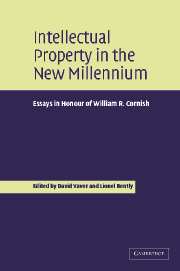Book contents
- Frontmatter
- Contents
- List of contributors
- Foreword
- Preface
- General intellectual property
- Patents and plant protection
- 5 Creating the community patent and its court
- 6 Patents – what's invention got to do with it?
- 7 Common law and civil law approaches to patent claim interpretation: ‘fence posts’ and ‘sign posts’
- 8 Indirect infringement of patents in Israel: judge-made law
- 9 Genomics and the food industry: outlook from an intellectual property perspective
- 10 From ‘outmoded impediment’ to global player: the evolution of plant variety rights
- Trade marks and unfair competition
- Copyright, moral and neighbouring rights
- William R. Cornish – curriculum vitae
- Index
10 - From ‘outmoded impediment’ to global player: the evolution of plant variety rights
Published online by Cambridge University Press: 25 May 2010
- Frontmatter
- Contents
- List of contributors
- Foreword
- Preface
- General intellectual property
- Patents and plant protection
- 5 Creating the community patent and its court
- 6 Patents – what's invention got to do with it?
- 7 Common law and civil law approaches to patent claim interpretation: ‘fence posts’ and ‘sign posts’
- 8 Indirect infringement of patents in Israel: judge-made law
- 9 Genomics and the food industry: outlook from an intellectual property perspective
- 10 From ‘outmoded impediment’ to global player: the evolution of plant variety rights
- Trade marks and unfair competition
- Copyright, moral and neighbouring rights
- William R. Cornish – curriculum vitae
- Index
Summary
Introduction
In the second edition of his textbook, Intellectual Property, Cornish described plant variety rights as an ‘outmoded impediment’ which obstructed the ‘logical framework of protection’, namely the use of patents for the protection of plant material. Cornish also remarked that it was equally true to call the exclusion of plant varieties from patent protection an ‘outmoded impediment’ and this view reflected a mood in European patent circles that the exclusion, which many national patent laws contain, was an anachronism. The right had been introduced to serve a specific purpose in the 1960s, but now was thought to impose ‘unwarranted barriers against some of those who invest in biotechnical and agricultural research and wish to have patents for their successful results’. Retaining the exclusion, Cornish predicted, would result in ‘the EPC provision [being] progressively pared down by interpretation’. In light of these views he cautioned, in a footnote, that those then engaged in a revision of the International Convention for the Protection of New Plant Varieties (UPOV) ‘ought to consider whether the regime has a viable future’. This appears to be a thinly veiled criticism of plant variety rights in general and, the so-called ‘dual protection prohibition’, contained in Article 2(1) of the UPOV Convention 1978, in particular. It is this latter (which the original 1961 UPOV Act also contained) which is regarded by some as the cause of the exclusion of plant varieties from patent protection.
- Type
- Chapter
- Information
- Intellectual Property in the New MillenniumEssays in Honour of William R. Cornish, pp. 137 - 156Publisher: Cambridge University PressPrint publication year: 2004
- 2
- Cited by



